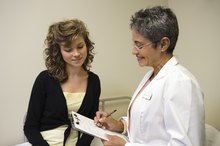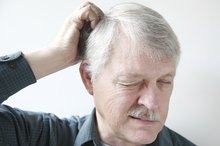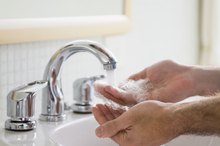Home Remedy for an Infected Pimple
An infected pimple occurs when the follicle under your skin’s surface clogs from excess oil, dirt buildup or dead skin cells, which allows bacteria to form and cause the infection. Pimples, or acne, can develop on any area of the skin, but the common areas include the face, chest, shoulders, neck and upper back. According to the University of Maryland Medical Center, acne affects approximately 17 million individuals in the United States 1. Home remedies are available to treat infected pimples, but they are not a substitute for medical treatment. Consult with your health care provider to discuss treatment options or potential risks.
Apply a mild cleanser to a washcloth and gently scrub the affected area, rinse with warm water and dry with a clean towel. Cleansing your skin twice a day helps to reduce the excess oil and dirt from your skin to help reduce or eliminate pimples, as suggested by the American Academy of Dermatology 2.
How to Tell Acne From Staph
Learn More
Apply benzoyl peroxide to infected pimple. Benzoyl peroxide is available over-the-counter. Follow the manufacturer’s directions when applying the product to your skin. Benzoyl peroxide helps to eliminate the bacteria that causes acne and reduces the fatty acid that irritates pores, according to Dr. James E. Fulton, the founder of Acne Research Institute in California and coauthor of “Dr. Fulton’s Step-by-Step Program for Clearing Acne.”
Put on a thin layer of aloe vera gel. Aloe vera contains natural antibiotic and antiseptic properties that may help reduce the inflammation and eliminate the bacteria. In addition, some products are available that offer a combination of benzoyl peroxide and aloe vera.
What Is the Difference Between Cellulitis & Mrsa?
Learn More
Schedule an appointment with your health care provider or a dermatologist if the infected pimple begins to worsen. A doctor may prescribe a topical or oral medication to treat the infected skin area.
Tips
Do not squeeze the infected pimple. Squeezing it releases the bacteria on the skin and may cause more acne to form. Avoid applying the benzoyl peroxide or aloe vera gel around the eye area.
Warnings
Do not mix treatments, such as benzoyl peroxide and prescription medications. The over-the-counter benzoyl peroxide is similar in ingredients to the topical prescriptions, such as Retin-A and should not be combined, according to Dr. Thomas Gossel, a professor at the Ohio Northern University in Ada.
Related Articles
References
- University of Maryland Medical Center: Acne
- American Academy of Dermatology: Acne
- Matin T, Goodman MB. Benzoyl Peroxide. [Updated 2020 Mar 16]. In: StatPearls [Internet]. Treasure Island (FL): StatPearls Publishing; 2020 Jan-. Available from: https://www.ncbi.nlm.nih.gov/books/NBK537220/
- Matin T, Goodman MB. Benzoyl Peroxide. [Updated 2020 Mar 16]. In: StatPearls [Internet]. Treasure Island (FL): StatPearls Publishing; 2020 Jan-.
- U.S. Department of Health and Human Services Food and Drug Administration Center for Drug Evaluation and Research (CDER). Topical Acne Drug Products for Overthe-Counter Human Use — Revision of Labeling and Classification of Benzoyl Peroxide as Safe and Effective Small Entity Compliance Guide. June 2011. fda.gov
- Burkhart CG, Burkhart CN. Antibacterial properties of benzoyl peroxide in aerobic and anaerobic conditions. Int J Dermatol. 2006;45(11):1373‐1374. doi:10.1111/j.1365-4632.2006.02877.x
- Zaenglein AL, Pathy AL, Schlosser BJ, et al. Guidelines of care for the management of acne vulgaris. J Am Acad Dermatol. 2016;74(5):945-73.e33. doi:10.1016/j.jaad.2015.12.037
- Masini F, Ricci F, Fossati B, et al. Combination therapy with retinaldehyde (0.1%) glycolic acid (6%) and efectiose (0.1%) in mild to moderate acne vulgaris during the period of sun exposure--efficacy and skin tolerability. Eur Rev Med Pharmacol Sci. 2014;18(16):2283‐2286.
- Chularojanamontri L, Tuchinda P, Kulthanan K, Pongparit K. Moisturizers for Acne: What are their Constituents?. J Clin Aesthet Dermatol. 2014;7(5):36‐44.
- Kim C, Craiglow BG, Watsky KL, Antaya RJ. Allergic Contact Dermatitis to Benzoyl Peroxide Resembling Impetigo. Pediatr Dermatol. 2015;32(4):e161‐e162. doi:10.1111/pde.12585
- Burkhart CG, Burkhart CN. Treatment of acne vulgaris without antibiotics: tertiary amine-benzoyl peroxide combination vs. benzoyl peroxide alone (Proactiv Solution). Int J Dermatol. 2007;46(1):89‐93. doi:10.1111/j.1365-4632.2007.03081.x
- Kircik LH. The role of benzoyl peroxide in the new treatment paradigm for acne. J Drugs Dermatol. 2013;12(6):s73-6.
Writer Bio
Based in Massachusetts, Carolyn Russell-DeLucas has been writing since 2007. She specializes in topics related to health, beauty and nutrition. Russell-DeLucas graduated from Brevard Community College with an Associate of Arts.








